Items filtered by date: May 2022
What Does a Plantar Wart Look Like?
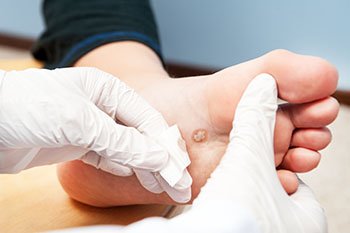
The human papillomavirus (HPV) is responsible for the development of plantar warts. It is defined as a wart that forms on the bottom of the foot, and grows inward as a result of the weight the feet bear on a daily basis. They are contagious, and this particular virus lives in warm and moist environments which can include public swimming pools, shower room floors, and locker rooms. It is beneficial to wear appropriate shoes while in these areas, and to refrain from sharing towels, shoes, and socks. This may help to prevent the spread of HPV. Plantar warts appear as small hardened areas of skin with tiny black dots in the center, and can cause severe pain and discomfort. Plantar warts can make it difficult to walk, and it is suggested that you consult a podiatrist who can properly treat or remove this type of wart.
Plantar warts can be very uncomfortable. If you need your feet checked, contact one our our podiatrists from Newtown Comprehensive Foot Care. Our doctors will assist you with all of your foot and ankle needs.
About Plantar Warts
Plantar warts are the result of HPV, or human papillomavirus, getting into open wounds on the feet. They are mostly found on the heels or balls of the feet.
While plantar warts are generally harmless, those experiencing excessive pain or those suffering from diabetes or a compromised immune system require immediate medical care. Plantar warts are easily diagnosed, usually through scraping off a bit of rough skin or by getting a biopsy.
Symptoms
- Lesions on the bottom of your feet, usually rough and grainy
- Hard or thick callused spots
- Wart seeds, which are small clotted blood vessels that look like little black spots
- Pain, discomfort, or tenderness of your feet when walking or standing
Treatment
- Freezing
- Electric tool removal
- Laser Treatment
- Topical Creams (prescription only)
- Over-the-counter medications
To help prevent developing plantar warts, avoid walking barefoot over abrasive surfaces that can cause cuts or wounds for HPV to get into. Avoiding direct contact with other warts, as well as not picking or rubbing existing warts, can help prevent the further spread of plantar warts. However, if you think you have developed plantar warts, speak to your podiatrist. He or she can diagnose the warts on your feet and recommend the appropriate treatment options.
If you have any questions please feel free to contact our office located in Newtown, CT . We offer the newest diagnostic and treatment technologies for all your foot and ankle needs.
It's Time for Beautiful Feet
The Heel of My Foot Hurts!
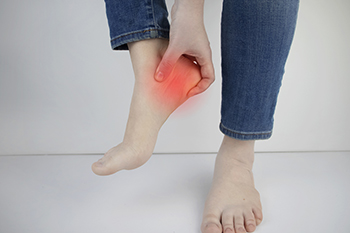
Many people complain about pain in the heel of their foot at some point in their lives. Plantar fasciitis, or inflammation of the plantar fascia, is one of the most common causes of this. The plantar fascia is the broad band of connective tissue running along the bottom of the foot that joins the heel bone to the toes, provides support for the arch of the foot, acts as a shock absorber, and bears the body’s weight. Plantar fasciitis develops when this band of tissue becomes irritated, torn, or inflamed. This condition can be extremely painful, especially with the day’s first steps. The pain at the bottom of the heel, and sometimes the midfoot area, can be sharp and stabbing or dull and achy. Once a person starts walking, the pain usually reduces but it may come on again after prolonged periods on one’s feet or when standing after sitting for a while. While causes of plantar fasciitis are not clear, research shows that heel spurs can result from plantar fasciitis, which can cause pain. This ailment is common among athletes, those who are on their feet a lot, and those who are obese. If you are suffering with heel pain, it is suggested you see a podiatrist who can make a proper diagnosis and lead you in treatment.
Plantar fasciitis can be very painful and inconvenient. If you are experiencing heel pain or symptoms of plantar fasciitis, contact one our our podiatrists from Newtown Comprehensive Foot Care. Our doctors can provide the care you need to keep you pain-free and on your feet.
What Is Plantar Fasciitis?
Plantar fasciitis is the inflammation of the thick band of tissue that runs along the bottom of your foot, known as the plantar fascia, and causes mild to severe heel pain.
What Causes Plantar Fasciitis?
- Excessive running
- Non-supportive shoes
- Overpronation
- Repeated stretching and tearing of the plantar fascia
How Can It Be Treated?
- Conservative measures – anti-inflammatories, ice packs, stretching exercises, physical therapy, orthotic devices
- Shockwave therapy – sound waves are sent to the affected area to facilitate healing and are usually used for chronic cases of plantar fasciitis
- Surgery – usually only used as a last resort when all else fails. The plantar fascia can be surgically detached from the heel
While very treatable, plantar fasciitis is definitely not something that should be ignored. Especially in severe cases, speaking to your doctor right away is highly recommended to avoid complications and severe heel pain. Your podiatrist can work with you to provide the appropriate treatment options tailored to your condition.
If you have any questions please feel free to contact our office located in Newtown, CT . We offer the newest diagnostic and treatment technologies for all your foot and ankle needs.
Contagious Athlete’s Foot
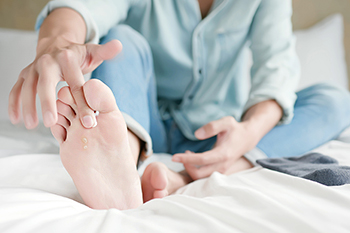
Tinea is the name of the fungus that causes athlete’s foot. It is a condition that affects the feet and is considered to be contagious. The symptoms that accompany athlete’s foot include itchiness, dry skin, and in severe cases, small blisters. This virus lives and thrives in warm and moist environments, including public swimming pools, locker rooms, and shower room floors. It is suggested that appropriate shoes are worn while in these areas, and it is beneficial to refrain from sharing towels. Additionally, washing and drying the feet thoroughly, and wearing clean socks daily, may help to prevent athlete's foot. There are many treatments for athlete’s foot, and it is advised that you consult with a podiatrist who can determine what the best one is for you.
Athlete’s foot is an inconvenient condition that can be easily reduced with the proper treatment. If you have any concerns about your feet and ankles, contact one our our podiatrists from Newtown Comprehensive Foot Care. Our doctors will treat your foot and ankle needs.
Athlete’s Foot: The Sole Story
Athlete's foot, also known as tinea pedis, can be an extremely contagious foot infection. It is commonly contracted in public changing areas and bathrooms, dormitory style living quarters, around locker rooms and public swimming pools, or anywhere your feet often come into contact with other people.
Solutions to Combat Athlete’s Foot
- Hydrate your feet by using lotion
- Exfoliate
- Buff off nails
- Use of anti-fungal products
- Examine your feet and visit your doctor if any suspicious blisters or cuts develop
Athlete’s foot can cause many irritating symptoms such as dry and flaking skin, itching, and redness. Some more severe symptoms can include bleeding and cracked skin, intense itching and burning, and even pain when walking. In the worst cases, Athlete’s foot can cause blistering as well. Speak to your podiatrist for a better understanding of the different causes of Athlete’s foot, as well as help in determining which treatment options are best for you.
If you have any questions please feel free to contact our office located in Newtown, CT . We offer the newest diagnostic and treatment technologies for all your foot and ankle needs.
Do I Have Toenail Fungus?
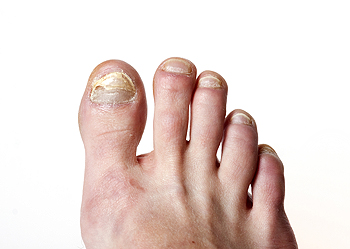
Toenail fungus, or onychomycosis, is an infection of the toenail that causes the nail to become discolored, thick, and prone to cracking and breaking. There is typically no pain associated with toenail fungus unless it becomes severe. Fungal nail infections are caused by different types of yeasts or molds in the environment that can get into the nail and cause an infection. The elderly, diabetics, those with weakened immune systems or blood circulatory problems, and those with athlete’s foot are more apt to get toenail fungus. To prevent toenail fungus, regularly wash and dry the feet, clip toenails straight across, do not walk barefoot in public areas, and beware of those who might have athlete’s foot as it is highly contagious. Visit a podiatrist to have your toenails checked if you suspect you have toenail fungus for a diagnosis and suggestions for treatment.
If left untreated, toenail fungus may spread to other toenails, skin, or even fingernails. If you suspect you have toenail fungus it is important to seek treatment right away. For more information about treatment, contact one our our podiatrists of Newtown Comprehensive Foot Care. Our doctors can provide the care you need to keep you pain-free and on your feet.
Symptoms
- Warped or oddly shaped nails
- Yellowish nails
- Loose/separated nail
- Buildup of bits and pieces of nail fragments under the nail
- Brittle, broken, thickened nail
Treatment
If self-care strategies and over-the-counter medications does not help your fungus, your podiatrist may give you a prescription drug instead. Even if you find relief from your toenail fungus symptoms, you may experience a repeat infection in the future.
Prevention
In order to prevent getting toenail fungus in the future, you should always make sure to wash your feet with soap and water. After washing, it is important to dry your feet thoroughly especially in between the toes. When trimming your toenails, be sure to trim straight across instead of in a rounded shape. It is crucial not to cover up discolored nails with nail polish because that will prevent your nail from being able to “breathe”.
In some cases, surgical procedure may be needed to remove the toenail fungus. Consult with your podiatrist about the best treatment options for your case of toenail fungus.
If you have any questions, please feel free to contact our office located in Newtown, CT . We offer the newest diagnostic and treatment technologies for all your foot care needs.
Exercises Can Help Improve Balance
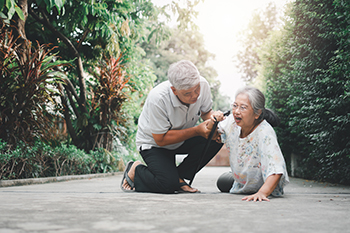
Many people begin to develop balance problems as they age, putting them at a higher risk of falling. A few simple exercises can be done at home to improve health and mobility. (If you haven’t done any exercise in a while, it is always a good idea to check in with a health professional before embarking on any new program.) Just to be safe during these simple exercises, be sure to stand near a wall or chair, or keep a walking aid nearby before starting. It’s a good idea to start cautiously, building up the number of repetitions gradually to avoid injury. Heel-to-toe walk: Place the heel of your right foot directly in front of your left, looking straight ahead, and step down. Repeat 5 times. You may need to lightly touch the wall for stability. One-leg stand: Stand facing the wall, arms straight out in front, and lightly touch the wall in front of you. Lift one foot off the floor and hold for 5 -10 seconds. Repeat with the other foot. Do this 3 times. Sideways walking: Stand up straight with both feet together. Step out to the side with one foot, transfer your weight, and bring the other foot next to it. Repeat 10 steps. Then reverse direction. If you continue to experience balance problems, it may be a good idea to check in with a podiatrist for a complete biomechanical evaluation.
Preventing falls among the elderly is very important. If you are older and have fallen or fear that you are prone to falling, consult with one our our podiatrists from Newtown Comprehensive Foot Care. Our doctors will assess your condition and provide you with quality advice and care.
Every 11 seconds, an elderly American is being treated in an emergency room for a fall related injury. Falls are the leading cause of head and hip injuries for those 65 and older. Due to decreases in strength, balance, senses, and lack of awareness, elderly persons are very susceptible to falling. Thankfully, there are a number of things older persons can do to prevent falls.
How to Prevent Falls
Some effective methods that older persons can do to prevent falls include:
- Enrolling in strength and balance exercise program to increase balance and strength
- Periodically having your sight and hearing checked
- Discuss any medications you have with a doctor to see if it increases the risk of falling
- Clearing the house of falling hazards and installing devices like grab bars and railings
- Utilizing a walker or cane
- Wearing shoes that provide good support and cushioning
- Talking to family members about falling and increasing awareness
Falling can be a traumatic and embarrassing experience for elderly persons; this can make them less willing to leave the house, and less willing to talk to someone about their fears of falling. Doing such things, however, will increase the likelihood of tripping or losing one’s balance. Knowing the causes of falling and how to prevent them is the best way to mitigate the risk of serious injury.
If you have any questions, please feel free to contact our office located in Newtown, CT . We offer the newest diagnostic and treatment technologies for all your foot care needs.

